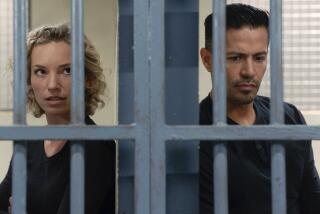Would C-SPAN count?
- Share via
JUST WHAT, EXACTLY, constitutes a program that’s too violent for kids to watch on TV? How about the story of a gun-blasting bounty hunter destroying a neighborhood as he tries to kill or capture his nihilistic offspring? That, after all, is what one sees in Walt Disney’s “Lilo & Stitch,” a hit movie for ... kids, and a perfect illustration of the fundamental problems posed by Congress’ flirtation with regulating violent TV programming.
Responding to a request from lawmakers, the Federal Communications Commission has drafted a report outlining what Congress might do to curb excessively violent programs. Objectionably violent shows, it says, could be banned during the hours that children are most likely to be watching TV (6 a.m. to 10 p.m.), just as indecent programming is. Congress could force cable operators to sell channels on an a la carte basis, rather than bundling them into packages that can’t be customized. And the difficult task of defining excessive violence could be done by the federal government without violating the 1st Amendment.
There’s plenty of evidence that television shows are more graphically violent than ever, both on cable networks and on free over-the-air TV. Simply noting this problem, however, doesn’t prove that government censorship can solve it.
Requiring programs such as “24” to be aired after 10 p.m. wouldn’t stop kids from watching a recorded version the next afternoon. Nor would it have much effect on the Internet, where networks are posting a growing number of reruns for viewers to watch on demand. And it’s hard to imagine Congress barring news programs before 10 p.m., and there’s no shortage of violence on the news.
A similar problem underlies the proposal to mandate a la carte cable pricing. It would be a boon to consumers if cable and satellite TV operators did business this way. But even in an a la carte regime, the channels with programming that distresses anti-violence activists are likely to be among the most frequently bought, simply because their programs are in high demand.
What censorship would do is deter networks from airing valuable but bloody shows that don’t quite qualify as news, while generating lawsuits over what inevitably will be inconsistent standards for judging violence on TV. Would cartoons be treated the same way as live action? How about realistic historical fare? Would “Saving Private Ryan” get a pass? Then how about “The Passion of the Christ”? What about psychological violence?
The government shouldn’t be making these calls; parents should. Online, there’s plenty of help for parents trying to identify inappropriate shows for their kids, and there’s technology in every TV set, cable converter box and satellite receiver to help screen out violent programming. If they still don’t like how much violence their TV is bringing into their home, they should just turn it off.
More to Read
The biggest entertainment stories
Get our big stories about Hollywood, film, television, music, arts, culture and more right in your inbox as soon as they publish.
You may occasionally receive promotional content from the Los Angeles Times.










